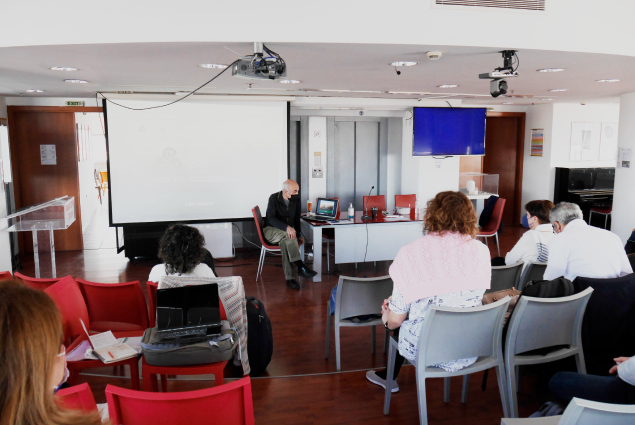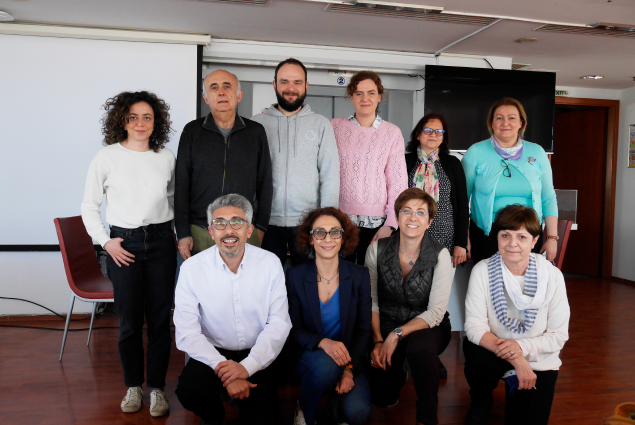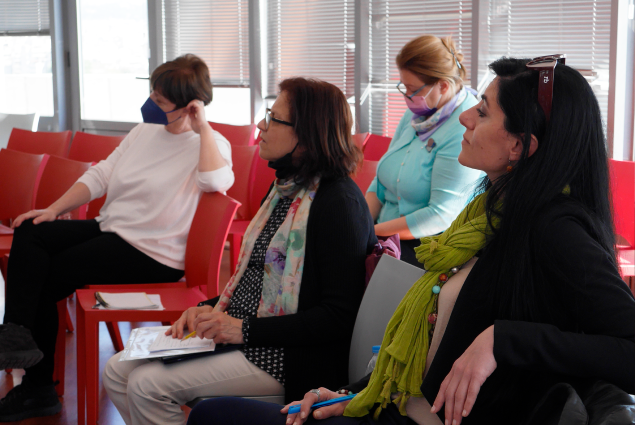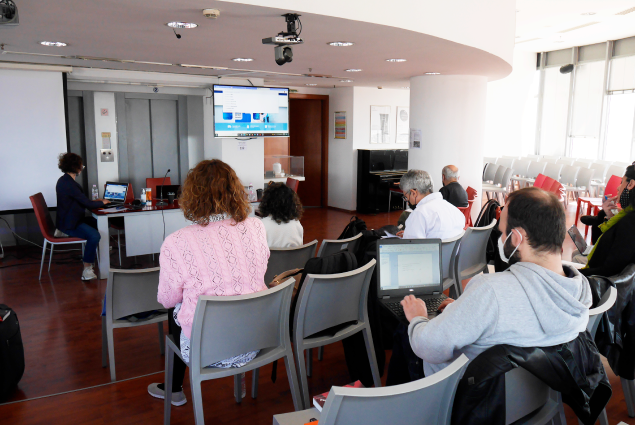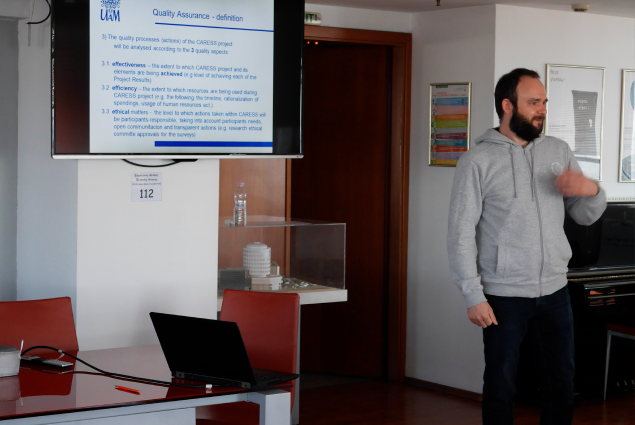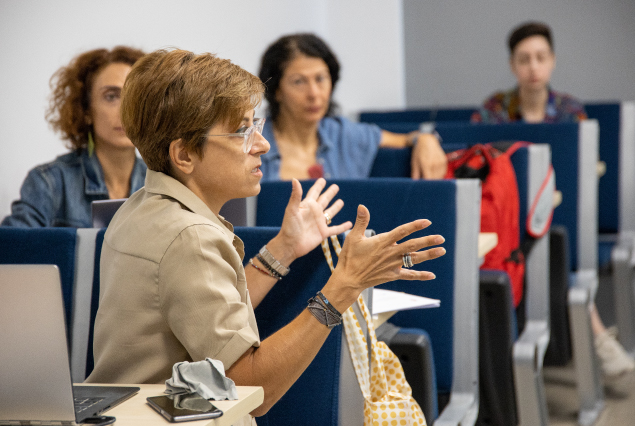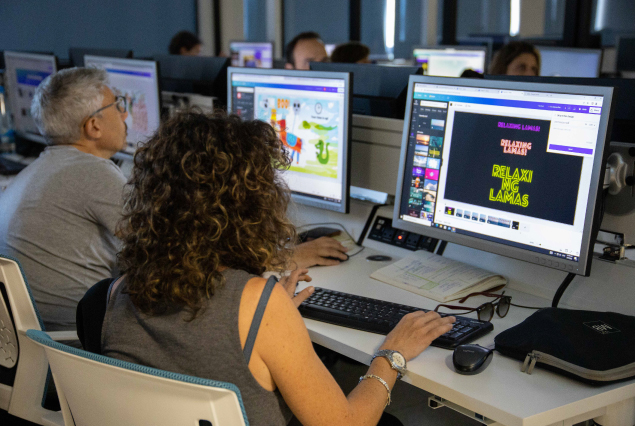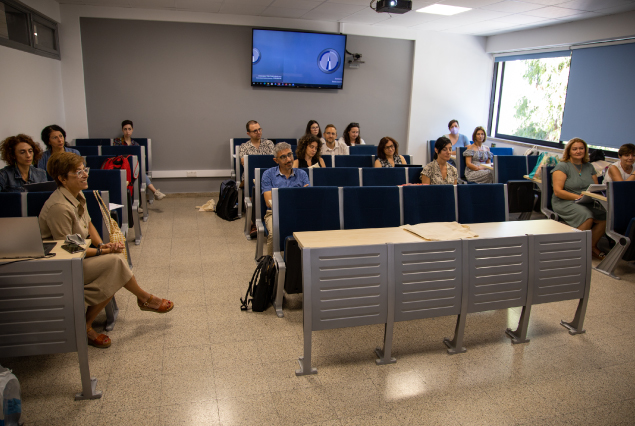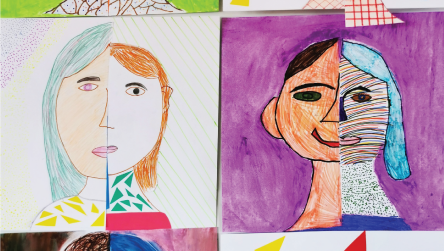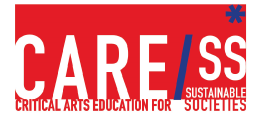
Critical ARts Educationfor Sustainable Societies
Information
Project CARE/SS is about widening the access to the arts through online and blended learning and enhancing arts education with education for sustainable development elements that will promote creative thinking, critical and systemic thinking, reflection and development of skills, attitudes and values. (Pavlou & Kadji 2021, Vare et al. 2019). Thus, through the content of the trainings, CARE/SS responds to the need to support educational programs that enhance social and intercultural competences, critical thinking & creativity. Education through the arts, especially with the integration of education for sustainable development (particularly the social and cultural aspects), reflects the transition into the 21st century education where emphasis is placed on sustainable competences, such as empathy, attentiveness, participation, values, responsibility, decisiveness, criticality, action, and creativity (Pavlou & Kadji 2021, Vare et al. 2019, Hutchens & Pankratz 2000, Inwood 2010, Kim 2015)
The project aims to enable HEI's digital transformation, to support the development & delivery of teacher training programs that will empower school teachers in arts teaching and thus strengthen their teaching profile. At the same time teachers/future teachers will develop their digital and soft skills and acquire quality experience of learning-teaching situations in a digital environment that could be transfer in primary/secondary levels of schooling. We aim at high quality arts education by responding to the increasingly diverse learners' needs and connect education with teachers and pupils' real life needs.
As was demonstrated since the break out of the COVID-19 pandemic, there is a need to widen the access to quality education and support digital transformation in HEIs (UNESCO 2020). Especially in programs / courses / training courses that are addressed to educators. Training in-service and pre-service educators through digital pedagogy and digital modes of learning not only support their personal digital skills and competences but also their pedagogical competences in teaching in a digital environment and using a variety of digital tools.
The European Framework for the Digital Competence of Educators (DigCompEdu) will be an important underlying variable for the CARE/SS Project (RedeckerPunie & Punie Redecker, 2017).
Priorities
While distance learning degrees have seen an incredible growth in the last 20 years, the access to arts education in Higher Education has not really widened. This is attributed to the few fully online or blended bachelor degrees in education and to the centrality that the experiential component has in the disciplines of arts education (visual arts, music, theatre & dance) which for some is in dissonance with the very nature of eLearning. Up to recently there were very few pieces of literature or research discussing online or blended learning in the context of preservice teacher training or of master degrees or of continuous teacher development training courses in arts education. This has changed recently due to the COVID-19 lockdown that had a global effect to the way education has been carried. HEIs moved quickly to emergency remote teaching. However, not all arts educators were prepared to teach in an imposed distance- learning environment.
Public elementary & secondary schools did not move as quickly as HEIs did. The subjects that appeared to suffer most were those that had a strong experiential component, especially the arts. At the same time, it is important to highlight that the arts subjects are the most important ones in difficult times for empowering children to overcome emotional difficult situations, to build children’s resilience, to enhance understanding of others, to encourage engagement and participation leading to the development of sustainable societies. It is evident that education in the 21st c. needs to be radically revisited in terms of the objectives, knowledge, skills and competences it has to develop. Serving solely the economic growth can no longer be viewed as the ideal way of reconciling material progress with equity, respect for the human condition & common values &respect for the natural resources for present and future generations. Bell questions the sustainability of the global economy and stresses that unless the 21st c. education is viewed through a sustainability lens, we would be missing some of the most urgent elements it should address: peace, freedom, social justice, etc. Education through the arts focuses on human interactions and its social context rather than seeing arts as an independent and private symbolic space. The stereotypical view of the artist (or the learner in the arts) as autonomous, self-focused and neutral is thus challenged. Arts-producing and responding to arts are viewed as vehicles for identifying social issues (e.g. social inequalities) and thus serve as a means for promoting social justice, and - in some cases - for social and political activism. CARE/SS follows a post-modern philosophy, which embraces more pluralistic practices in arts education, especially as related to cultural and social issues.
Teachers face a range of changing educational demands & need support so that schools can retain highly qualified and motivated teachers who will provide learners with consistent, high-quality, equal educational opportunities that will enable them to reach their full academic potential. Overwork & lack of support are driving teachers in many European countries out of the profession much faster than they can be replaced. Overload also leads to neglecting important and challenging aspects of education. CARE/SS aims to respond to the above needs by focusing on supporting digital transformation through development of digital readiness, resilience & capacity in Higher Institutions responsible for teacher training to widen the access to quality arts training. A pedagogical framework will be developed specifically for arts education following a blended and a fully online option. Academics will be supported to develop innovative courses in arts education within undergraduate or postgraduate degrees or as continuous professional development courses adopting a transdisciplinary approach that focuses on socially engaged arts.
CARE/SS aims to develop a transformative pedagogical framework for online and blended learning specifically for arts education and test its application by developing and delivering innovative teacher trainings that will empower teachers in arts education. Arts education can respond to the increasingly diverse needs for active citizenship, multiculturalism, respect of diversity, digital learning and sustainable development.
CARE/SS pecifically seeks to:
- Develop a transformative pedagogical framework for online and blended learning specifically for arts education and contemporary developments in the arts that are characterized by the experiential/practical component of these fields and the creative production of messages which are socially negotiated and culturally formed. Also to train academics to utilize this framework.
- Develop localized training curricula and materials (by the trained academics) within undergraduate or postgraduate degrees or continuous professional development courses addressed to pre-service and/or in-service primary school teachers and/or secondary school teachers with no arts specialization. Further academics will be required to adopt a transdisciplinary approach with the flexibility of focusing to couple or more of the arts disciplines and giving the weight to one or more than one of these disciplines.
- Evaluate local teacher training programs based on the innovative educational practices emerging by online and/or blended learning as well as a transdisciplinary approach for arts education.
- Create a culture of collaboration to promote excellence between participants, through establishing professional communities of learning as a means of professional development. Peer support is a crucial component of social learning.
- Revise the framework based on the case studies and produce a handbook to support Higher
Education Institutions to develop and implement innovative arts education courses in an online and blended environment. The guide will include illustrations based on the local teacher training programs.
- Stage 1 (Project result 1): Pedagogical framework for online and blended learning for arts education
While distance learning degrees have seen an incredible growth in the last 20 years (Allen & Seaman, 2017; Valverde-Berrocoso, Garrido-Arroyo, Burgos-Videla, & Morales-Cevallos, 2020), the access to arts education in Higher Education has not really widened. On the one hand this is attributed to the few fully online or blended bachelor degrees in education (Becker, Gereluk, Dressler & Eaton 2015). On the other hand, it is attributed to the centrality that the experiential component has in the disciplines of arts education (visual arts education, music education, theater/drama education and dance education) which for some is in dissonance with the very nature of eLearning (Baker et al. 2016). Up to recently there were very few pieces of literature or research discussing online or blended learning in the context of preservice teacher training in arts education (Cutcher & Cook, 2016) or of online or blended master degrees in arts education (Buhl & Ejsing-Duun 2015) or of online or blended continuous teacher development training courses. This has changed recently due to the COVID-19 lockdown that had a global effect to the way education has been carried (Azorìn, 2020; Harris, 2020; Rapanta et al, 2020; UNESCO, 2020). Higher Education Institutions moved quickly to emergency remote teaching. However, not all arts educators were prepared to teach in an imposed distance-learning environment that became inevitable due to health and safety measure. Arts Education Academics’ perceptions of eLearning and teaching in primary education degrees or master degrees in education need to be addressed in order to respond to their concerns regarding quality in their teaching (Baker et al. 2016).
Project Result 1 (PR1) aims to respond to the above needs of academics in the disciplines of arts education. The project result innovates aims in developing an innovative pedagogical framework specifically for their needs thus preparing academics to deliver quality arts education under normal or emergency conditions by making appropriate use of fully online or blended modes of learning. The expected impacts will benefit arts educators/academics across Europe, students-teachers and in-service teachers attending courses/degrees/training programs in Higher Education Institutions (HEIs) as the mode of the course development will offer better learning educational experiences to learners and high quality of education. Provision has be taken for the framework's versatility and transferability as it does not focus on a single art education discipline (e.g. visual arts education) but on all different disciplines in the arts. Further transferability potential relates to degrees of study other than education (e.g. arts' relevant degrees such as graphic designer). Moreover, the PR1 has the potential to transfer knowledge into online learning in primary and secondary education when emergencies arise. The same framework may be applicable to these levels of education. Also primary and secondary educators that will be educated through it (when student-teachers or during an in-service training program) will be able to utilize it in the teaching practice, if needed.
- Stage 2 (Project Result 2): Curricula for local teacher training programs
This output contains a state-of the arts literature review about education through the arts, including experiential learning and critical pedagogy in emergency - or normalcy-contexts, curricula of teacher education courses and training materials. The content of the teacher education courses will be connected with the principles of critical pedagogy and sustainable development, especially the social and cultural aspect of it. Arts can enable education to approach challenging socioeconomic, cultural and environmental issues that twenty-first century humankind has to address through the use of expression as a means for action that informs and raises personal and public awareness. Education for Sustainable Development is education for the 21-century as it seeks to prepare learners for the varied and interrelated environmental, social, and economic challenges they will meet as they confront the changing world. It emphasizes systemic and critical thinking for a better awareness of the present, along with future thinking, values and strategic planning that will enable learners to unlock their creativity and flourish in a more sustainable economy (Bell 2016). It sets goals, addresses all 21- century education priority issues and offers solid means (principles, philosophy and pedagogy) for the educational transition needed to meet these goals. Foremost, it is transformative education and holds the potential for supporting our transition towards a sustainable future. It enhances Arts Education, supports the establishment of links with real-life issues and leads to action. The infusion of sustainable development into Arts Education has implications for the educators’ role and the education they receive. These are important but marginalized aspects within the current arts practice in primary education. The curricula of teacher education courses are intended to demonstrate different ways in which the transformative pedagogical framework for online or blended learning in the arts education can be used to address the needs of different contexts/countries. These will address either undergraduate or postgraduate students in HEIs (studying to become primary school teachers or studying to receive a master degree in education with different backgrounds but no arts specialization) or in-service primary school teachers or in-service secondary school teachers with no arts specialization who want to participate in a professional development training program. The target groups will depend on the partners and their accessibility to different target groups. Having slightly different target groups, will contribute to
demonstration of the versatility of the framework for arts education. Overall the different courses/training programs will take into account different outcomes by placing an emphasis on a diversity of social, cultural and environmental contexts. The social, cultural and environmental particularities of the different participating countries (Greece, Malta, Cyprus, Spain, Poland) will provide a rich sense of biodiversity that will promote intercultural learning (learning about one's own environmental challenges as well as those of others). While specific challenges (for example, those related to urban over-development, marine pollution, refugees' crisis, etc) will help to contextualise these courses/programs, a series of common goals and advocacy issues will ensure a consistency to the project's main research aims. Along with the innovative design of the curricula, innovative training materials will be developed by each partner. One of the significant goals of this output - which also contributes to the project's originality - will also be the promotion of local artists' works and ideas across borders. The participants/trainees will be exposed to artists from other countries who are dedicated to sustainable development goals such as the reduction of inequalities and living together in peace.
- Stage 3 (Project Result 3): Teacher education delivery (case studies)
This project result intends to provide evidence-based support of the benefits of digital transformation in arts education that adopts the philosophy of socially engaged arts, and how these were utilized in the different countries for different needs. It responds to the needs of the target groups as presented in the previous two project results. This project result will highlight the flexibility and value of the transformative pedagogical framework for online or blended learning in arts education developed in PR1 and the philosophy of education through the arts agreed in PR2 in different contexts.
PR3 will present the case studies of the delivery of teacher education courses developed by the partners. It will include the results of the implementation of the courses/ training programs. These case studies will enable partners to argue about and demonstrate the transferability of the pedagogical framework for the course delivery mode along with the philosophy of the content of the delivery to other contexts, such as programs of study of arts disciplines in HEIs, delivery of arts education in primary and secondary schools or other contexts. Case studies are expected to demonstrate how pre-service and/or in-service teachers can develop their arts producing and arts responding skills along with pedagogical competences and reflective competences within an online or blended learning environment.
Trainees will have the opportunity to engage in creative and innovative uses of digital education content. Further the case studies will demonstrate how pre-service and/or in-service teachers can have a greater understanding of how to connect arts with real life issues, and have a greater understanding and responsiveness to social, ethnic, linguistic and cultural diversity and consequently be able to develop arts units focused on sustainable development goals, embracing common values, civic engagement and participation. Examples of socially engaged arts will be utilized to develop an awareness amongst teachers about the relevance of the work of contemporary artists whose work revolves around issues of social change, collaboration and justice. The participating students/ teachers - at least those who will participate in the fully online courses/trainings will receive an 'arts in the box' package which will further contribute to the quality of their training and the experiential aspect of their training. Further on, training the teachers and teacher students as agents of change with multiplier potential, will increase the project's
transferability and impact to their students and peers.
- Stage 4 (Project Result 4): Professional Learning Communities
Case studies of Professional Communities of Learning (PCLs) will be created, reporting on in-country and inter-country findings from the project. The CARESS project has a spirit of collaborative learning at its heart and, importantly, we view the PCLs as including both project participants (academics and teachers) and project partners (researchers, academics, trainers). Indeed, we hope that the CARE/SS project as an entirety will be a vibrant and productive PCL of people interested in quality arts education. Within the umbrella of the main CARE/SS project PCL, there are likely to be many PCLs of differing sizes, including very small PCLs where perhaps two or three students/teachers collaborate closely within an individual course/school. PR4 will shed light on these PCLs. It is anticipated that, through their involvement in the project, academics and teacher participants will form cooperative and collaborative working relationships with peers and learn with and from each other. These learning opportunities will take place in face-to-face (in-country) and virtual (in-country and inter- country) contexts. For instance, we intend to explore the potential of connecting teacher participants from different countries, as well as usefully keeping an electronic record of interchanges. We are interested in exploring innovative techniques to both facilitate and research the teachers’ professional learning, using, for example, visual/audio methods such as blogging, vlogging, photography, and journaling (book-based or electronic). Through a cycle of action and reflection these methods will be evaluated by participants and researchers/ trainers and modified, when required. As arts education is a key focus of the project, we will look to maximize the potential of creative, artistic methods for training and research purposes where these can effectively meet the project’s aims and objectives. In addition to data collected for the sole purpose of this research project, data will also be drawn from other research projects in order to construct the PCL case studies, as appropriate. We aim to investigate the opportunities and challenges that the project’s PCLs present; what social and physical factors foster or hinder communication, positive relationships, teacher confidence and competencies and perceptions of success. The PCL case studies will provide detail about places, people and processes in the CARE/SS project and will usefully highlight similarities and differences. The PCL case studies report will present our research findings and recommendations to policy makers, educational authorities, pedagogical institutions and any other key stakeholder who is interested in how online or blended teacher training in arts education might best be facilitated. The intention is that the PCL case studies will be communicated to different audiences in both academic and non-academic forms, in both full and summarized versions, in order to enhance the impact of the CARE/SS project’s findings. The project website will have a pivotal role in dissemination.
- Stage 5 (Project Result 5): Handbook for Academics
This Handbook includes educational/pedagogical materials for academics. It is designed especially to address academics/tutors/trainers' needs and considerations as described in earlier project results. Further it responds to the needs of policy makers/educational authorities/training organizations/etc. who are interested in widening access to quality arts education by means of online or blended modes of learning. For example, Greece has a large number of small islands where educators are deprived of opportunities for continuous professional development in the arts. The Handbook intends to be a practical and easy to use document, providing guidance and support to academics/tutors/trainers on how to implement online or blended teaching-learning activities based on the innovative aspects of CARE/SS. It will offer, among others, principles for teaching and learning lesson planning and principles for assessment. Additionally, it will include examples of best cases as identified during the implementation of the teacher education delivery, the micro-teaching and the arts units in schools or even raise issues of concerns and highlight cases where things did not go as expected. Further the Guide will include an adapted, if needed, transformative pedagogical framework for online or blended learning in arts education based on the lessons learnt during the implementation of the case studies. In other words, the guide is intended to facilitate academics/tutors/trainers' needs, enable them to implement innovative arts education that will be attractive and relevant to the lives of teachers and their pupils (or future pupils) and thus ensure the sustainability and transfer of the project outcomes to the target groups, taking into account their needs and different backgrounds. Provision has be taken for the framework's versatility and transferability as it does not focus on a single art education discipline (e.g. visual arts education) but on all different disciplines in the arts. Further transferability potential relates to degrees of study other than education (e.g. arts' relevant degrees such as graphic designer). Moreover, the PR1 has the potential to transfer knowledge into online learning in primary and secondary education when emergencies arise. The same framework may be applicable to these levels of education. Also primary and secondary educators that will be educated through it (when student-teachers or during an in-service training program) will be able to utilize it in the teaching practice, if needed.
CARE/SS is a multidimensional project that seeks to strengthen common attributes and objectives between digital learning, education through the arts and education for sustainable development maximizing the benefits for all areas. Through the project we seek to have a substantial positive impact on the participating organization and their staff and in particular to improve the skills and competencies of academics/tutors to offer quality arts education in a fully online or blended mode thus increasing the access to the arts.
Further, by focusing on critical pedagogy, sustainability, socially engaged arts academics can connect arts education with real life needs and important sustainable development goals. Consequently teachers-to be and teachers will be trained to promote the ideals of sustainable development through arts classes, enhance their classes with real life, school opening activities and thereby transmit these skills and values to their pupils. Simultaneously these activities can have an impact on all participating and collaborating organizations. More analytically the expected impact of CARE/SS would be:
- FOR ACADEMICS/ HEIs / TEACHER EDUCATION INSTITUTIONS:
- Supporting in innovative online pedagogies, including transdisciplinary approaches, new curriculum design, delivery and assessment methods
- Supporting in developing and testing virtual and blended types of cooperation and the use of different digital tools and online platforms
- Supporting and enhancing in-service teacher and pre-service training, in arts education (produced scientific knowledge and end products delivered by the project)
- Acquiring scientific knowledge and information on pedagogies that will promote the sustainability values and principles within their programs of study, especially within the arts education curricula
- Inspiring and supportive for the network and for other scholars
- Providing them with an insight into novel forms of teacher education based on adult learning that promote collaborative team work for obtaining common objectives in online or blended environment
- Contributing to the overall academic knowledge on socially engaged arts to achieve sustainable development goals
- Influencing on the practice of key people at teacher training institutions
- FOR STUDENTS (undergraduates & postgraduates) / TEACHER PRACTITIONERS/ SCHOOLS:
- Developing participants’ skills and competencies for transdisciplinary integration of SD values and concepts in arts education (e.g. connection of contemporary art with real life issues and SD values),
- Empowering participants’ abilities to transfer to their pupils/future pupils arts and SD skills, competencies and comprehension of SD concepts and issues (social, cultural and environmental).
- Providing professional growth to the participating teachers & offer increased motivation and satisfaction in daily work/ in their learning at the university
- Promoting a culture of professional collaboration, interaction and support to the peers that will result to the delivery of better education
- Inspiring and support collaboration and networking with teachers, schools and academic institutions
- FOR THE EDUCATIONAL AUTHORITIES:
- Supporting and enhancing the implementation of the new educational policy and curricula
- Influencing on the arts education and SD perceptions of key people at policy making positions
- Providing an insight to the current conditions and needs of teachers-to-be/ teachers in the area of arts education and its connection with real life and sustainability.
CARE/SS is a transnational project that seeks to strengthen common attributes and objectives between local/national policies for arts education and European common goals for arts and sustainable development.
The partners involved in this project are:
- Frederick University, Cyprus (Coordinator)
The University offers expertise in different arts disciplines in pre-primary & primary education, especially in interdisciplinary activities in art, music & literacy education and in European projects that focus on sustainable development (SD) in HEIs; currently Frederick University coordinates four (4) projects in SD, one of them being in teacher training in art education. Additionally, Frederick University is a recognized institution in distance learning courses.
- Adam Mickiewicz University (AMU), Poland
AMU has a strong Faculty of Education Studies with academics in all arts disciplines who bring experiences in international projects covering the usage of arts in critical discourse & critical pedagogy context aimed into social innovation & counteractions toward marginalization of disadvantaged groups.
- The Aristotle University of Thessaloniki (AUTH), Greece
With a strong School of Primary Education with several arts education courses and academics in art, drama/theatre & music education, the University's team also consists of a dance specialist, associate professor in movement as a means for interdisciplinary approaches. AUTH has experiences in projects where arts are seen as essential and effective catalyst for, and site of, sustainability.
- The Department of Arts, Open Communities and Adult Education, University of Malta (UOM), Malta
Our partners in Malta have strong educational links between visual, theatrical and musical practices & wider contexts that impact on various audiences, like the digital domain, media, museums & cultural or community-based groups. Through collaborative modes of production, mediation and critical pedagogies that engage young & adult learners, the department seeks to redefine the role of the arts & culture in society through the lens of education.
- The Universitat de Barcelona (UB), Spain
The University's Advanced Research Group: Contemporary Subjectivities, Visualities and Educational Environments (Esbrina) offers internationally acclaimed expertise in inclusive education, educational technology; visual culture and multiliteracies; educational innovation and improvement; educational assessment, etc.
CARE/SS aims to develop and deliver innovative online and/ or blended learning teacher education courses (pre-service & in-service) that will empower teachers in arts education within the principles of critical pedagogy and sustainable development and help them address contemporary educational challenges.
Here are the deliverables for each of the objectives of the project [PR=project result, A=activity]
1. Develop a transformative pedagogical framework for online and blended learning specifically for arts education
PR1_A1 State of the art - Online & blended learning in HEIs: literature review of important
reports/article/documents
PR1_A2 Academics' voice: interviews with academics to voice their concerns and perceptions
PR1_A3 The framework for arts education disciplines: development of the framework
PR1_A4 Train-the-Trainers (C1). Trainers will have an experiential learning of the framework and
deep familiarization with key aspects PR1_A5 Reporting
2. Develop localized training curricula and materials
PR2_A1 State of the art - Critical pedagogy & socially engaged arts: literature review of important
reports/article/documents
PR2_A2 Localized training programs - curricula
PR2_A3 Training materials for the localized training programs
PR2_A4 Reporting
3. Evaluate local teacher training programs based on the innovative educational practices emerging by online and blended learning as well as a transdisciplinary approach for socially engaged arts education
PR3_A1 Teacher contact & recruitment
PR3_A2 Research tools for assessment
PR3_A3 Training at the HEIs. At least seven local trainings will take place
PR3_A4 Theory into practice. Trainees will collaborate to implement theory into practice
PR3_A5 Report on training
4. Learn about how professional communities of learning in arts education can develop as they are an important component of capacity building for sustainable improvement
PR4_A1 Research tools & Data collection
PR4_A2 Reporting. Understanding the strengths and possible weaknesses of the development of
these communities through reporting on the results.
5. Produce a Handbook for academics on how to utilize online or blended learning modes in arts education to offer situated/authentic learning that responds to their learners’ needs & realities.
PR5_A1 Selection of best practices & review of framework. Preparatory stage. Evaluating teacher
delivery regarding
innovation, effectiveness, etc. Select best cases. Revise framework if needed
PR5_A2 Construction of Guide. Decide on the best way to present general guidelines as well as
specific examples. Amble illustrations through different means (visuals, music, videos).
Dissemination events and activities
A number of dissemination activities (such as ad hoc meetings with important key stakeholders, e.g. academics, arts inspectors, policy makers, representatives of teachers' associations, etc.) and of dissemination events (local and international event in the forms of seminars, workshops, presentations) are planned in order to reach practitioners, academics, teacher educators, policy makers etc and maximize the sustainability of the end products and their sustainability.
PRESS RELEASE #1
On April 8, 2022, the kickoff meeting of the partners of the European project Critical Arts Education for Sustainable Societies, which is funded by the Erasmus+ KA2, took place at Aristotle University of Thessaloniki, Greece. The coordinator of the project is Dr Victoria Pavlou, Associate Professor of Visual Arts, Chair of the Department of Education, Frederick University, Cyprus.
Project CARE/SS is about widening the access to the arts through online and blended learning and enhancing arts education with education for sustainable development elements that will promote creative thinking, critical and systemic thinking, reflection and development of skills, attitudes and values.
The project aims to enable Higher Education Institutions' digital transformation, to support the development and delivery of teacher training programs that will empower school teachers in arts teaching and thus strengthen their teaching profile. At the same time teachers/future teachers will develop their digital and soft skills and acquire quality experience of learning-teaching situations in a digital environment that could be transfer in primary/secondary levels of schooling. Thus, through the content of the trainings, CARE/SS responds to the need to support educational programs that enhance social and intercultural competences, critical thinking and creativity. Education through the arts, especially with the integration of education for sustainable development (particularly the social and cultural aspects), reflects the transition into the 21st century education where emphasis is placed on an integration of competences, knowledge, values and attitudes.
The project has a duration of 28 months and apart from Frederick University, its partners are the Aristotle University of Thessaloniki, Greece, the University of Malta, Malta, the University of Barcelona, Spain and the Adam Mickiewicz University, Poland.
- The press release was disseminated in the media and the European Office Cyprus' Newsletter (ISSUE 130, 16 - 23 May 2022)
Frederick University
- Announced CARE/SS activities through the newsletters of the European Office of Cyprus (EOC)
Press release for kick-off meeting: https://eoc.org.cy/en/index.php?id=3446
Press release for the 2nd TPM and train-the-trainer event https://eoc.org.cy/frederick-university-cyprus-a-successful-organisation-of-the-2nd-transnational-meeting-train-the-trainers-activity-of-the-care-ss-project/#more-1835
- Disseminated info about the CARE/SS project & invited teachers to participate in the training: emails & communication via phone or personal meetings with members of CySEA and Art group of POED. Both distributed information to their members.
- Announced (press releases) opportunities for in-service professional development to local educational sites & newspapers:
https://paideia-news.com/panepistimio-frederick/2023/01/19/dorean-diadiktyako-seminario-apo-to-panepistimio-frederick-gia-ekpaideytikoys-dimotikis-ekpaideysis/
https://eurokerdos.cyprustimes.com/business-news/events/dorean-diadiktyako-seminario-apo-to-panepistimio-frederick-gia-ekpaideytikoys-dimotikis-ekpaideysis/
https://www.stockwatch.com.cy/el/article/emporika-nea/dorean-diadiktyako-seminario-apo-panepistimio-frederick-gia-ekpaideytikoys
https://dialogos.com.cy/dorean-seminaria-ekpaideytikoys/
- Disseminated info through social media: https://m.facebook.com/story.php?story_fbid=pfbid0VoWsnywxbTdigDXJi2hknuvHPZEHp4CPdDeXXQtpyyRPPqDTm9RTxnWTq6rCMv9ql&id=100064582726573
- Announced to its website
https://www.frederick.ac.cy/en/latest-events/158-free-webinars-from-frederick-university-for-elementary-teachers
- Announced to its academic community through internal newsletter
https://mailchi.mp/frederick/our-journey-issue-21
Malta University
- Announced to its academic community the Erasmus awarded project: https://www.um.edu.mt/newspoint/news/2022/04/research-project-called-caress-awarded-erasmus-funding
- Disseminated information and invited teachers to participate in courses through social media: https://www.facebook.com/plugins/post.php?href=https%3A%2F%2Fwww.facebook.com%2Fraphael.vella.7%2Fposts%2Fpfbid02VgCmmUSJiUmnfqdv8WzbEXg7HGUevWsPanrav7vBSnuBAT7SQayrBjqceXGFzFmEl&show_text=true&width=500
Aristoteleio University of Thessaloniki:
-Information about the program on the official website of the AUTH. https://qa.auth.gr/en/project/72717
- Sent messages and invitations for a live information meeting for school counsellors & cultural stakeholders (January 2023) through the CAREfull platform https://carefull.web.auth.gr/
-The official invitation for the Teacher Training course will be sent early to the Directorates of Education in mid-June & will be communicated through social media, the department's official website, the Pedagogical Labatory's website and CAREfull later on.
Universitat de Barcelona:
- Disseminated information and invited teachers to participate in the in-service training through the Institut de Ciències de l’Educació (ICE): email messages and communication via the ICE web (https://www..ub.edu/idp/web/ca/cursos/ips/arts)
Uniwersytet im Adama Mickiewicza w Poznaniu:
- Information about the project posted on the official website of the Faculty of Educational Studies of AMU (https://wse.amu.edu.pl/strona-glowna)
- Information about the project & activities planned within it disseminated to the candidates for 2023/2024 Erasmus+ exchange (pre-service teachers) through the website of AMU-PIE courses offer (https://amupie.amu.edu.pl/?t=amupie&year=2023%2F2024)
-Dissemination during face-to-face meetings with representatives of local associations promoting art and/or working with gifted youth and local schools (Child Art Center in Poznań, the Foundation of the Design of Educational Space in Poznan, Dezydery Chlapowski Educational Association in Koscian, the School & Theatre "Lejery" in Poznan, International School of Poznan)
- Dissemination to the AMU community through internal meetings and seminars with units cooperating with Faculty of Educational Studies (e.g., University Center for Teachers Education, the Laboratory of Creative Activities in Social Space)
| Article/Presentation | Author | Journal/Conference | Date | Link |
|---|---|---|---|---|
| Drawing from pedagogy to policy: reimagining new possibilities for online art learning for generalist elementary teachers | Dr Victoria Pavlou | Arts Education Policy Review | 28 Jun. 2022 | https://bit.ly/3P7zX6s |
| Digital Transformation in Art Education for Pre-service and In-service Primary School Teachers: Potential and Challenges | Dr Victoria Pavlou | European Conference on Arts, Design & Education (ECADE) 2022 | 7th-10th of July, 2022 | https://vimeo.com/722819666 |


